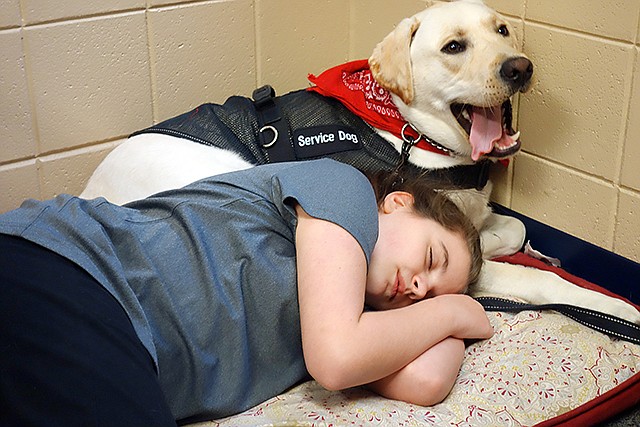Jefferson City High School on Thursday was the site of a rare after-school gathering, complete with plenty of tails and tales.
Almost all the teachers, building administrators and behavioral specialists who employ therapy dogs for their students gathered with their canine friends to share their experiences with the district's therapy dog program.
"It starts their day off in the right way," Lisa Dierking said of what her dog Shoney does for the at-risk students she works with at Southwest Early Childhood Center. Dierking is a social worker there, and Shoney is a 6-year-old female yellow lab.
The dogs serve in their respective buildings as tools to help students cope with a wide range of emotional and mental health issues.
Christina Du Bois said at the high school her dog Rhapsody provides therapy for students with autism and Down's syndrome, students who are non-verbal or others who suffer from anxiety. Du Bois is a special education teacher at the high school, and Rhapsody is a 2-year-old female standard poodle.
"She was able to complete a presentation because Scout was there," when she couldn't have otherwise, Dave Patton said of a student who copes with severe anxiety. Patton is assistant principal at Thomas Jefferson Middle School, and he employs Scout, a 7-year-old female golden retriever.
Dozer is a 1-year-old male yellow lab who works at Lewis and Clark Middle School with counselor Carrie DeSimone. Ethan Mell, an eighth-grader there, said Dozer has helped him with anger issues. "He's basically here to love on you and calm you down," Mell said.
DeSimone said she and Dozer see 15-20 students a day in her office. Dozer also walks with some students in the halls.
Dierking said the dogs are able to do something adults often cannot - calm a student down in seconds as opposed to minutes or even longer. The animals are also reinforcers of good behavior, with time spent with them serving as a reward for behavioral progress or even completion of tasks.
All of the dogs belong to their owners - not the district. The district approves employees' applications to get a therapy dog and has employees sign a three-year commitment to stay in the district in exchange for covering the expenses of the associated week-long training in Concordia, Kansas, said Dierking.
Concordia is where Canine Assistance Rehabilitation Education and Services (CARES) is based, and it's where owners pick up their dogs - without ever having met them or knowing what breed they'll be beyond the size preference they gave on their application.
Before school professionals or other clients - like veterans or people with medical conditions requiring assistance dogs - receive the animals from CARES, the dogs are trained for at least a few months, up to six, by people who are incarcerated.
"That was the most life-changing part of the training," DeSimone said of getting to meet incarcerated handlers as part of her experience with Dozer.
Some of the prisoners said it's "the first time in his life he's ever done anything positive," Cody Sharp said.
Sharp spoke with the News Tribune on Friday at the Prenger Family Center, where he is a behavior interventionist and teacher for at-risk students for JCPS. He works alongside Reuban, a 5-year-old male Papillon.
Together, they are the first human-canine duo to work at Prenger to help students serving suspensions and resident kids waiting for foster placement or completing treatment programs.

